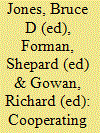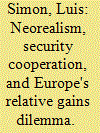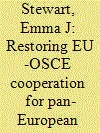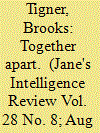| Srl | Item |
| 1 |
ID:
097411


|
|
|
|
|
| Publication |
Cambridge, Cambridge University Press, 2010.
|
| Description |
xv, 332p.
|
| Standard Number |
9780521889476, hbk
|
|
|
|
|
|
|
|
|
|
|
|
Copies: C:1/I:0,R:0,Q:0
Circulation
| Accession# | Call# | Current Location | Status | Policy | Location |
| 055047 | 341.2/JON 055047 | Main | On Shelf | General | |
|
|
|
|
| 2 |
ID:
153951


|
|
|
|
|
| Summary/Abstract |
Most neorealists argue that relative decline constitutes a systemic incentive for European security cooperation. Although this claim is broadly accepted, I argue that the relationship between relative decline and European security cooperation is complicated by a number of factors. First, European calculations about relative decline bear both a global and a regional (that is, intra-European) component. If a European country is to effectively mitigate relative decline, cooperation is not sufficient. It is just as important that cooperation develops in a way that underscores that country's comparative strengths and minimizes its weaknesses. In this regard, European countries are often in direct competition with each other. Secondly, when Europeans are thinking about their relative power position, some countries matter more than others: a given European country may accept to incur a relative loss vis-à-vis another country (European or otherwise) but not others. These calculations are further complicated by issue linkage. Some countries may accept relative losses on some issues (for example, security) in exchange for gains on others (economic). This article examines how intra-European considerations of relative gains affect the way in which Europe's main powers seek to cope with relative decline and assesses how those considerations affect security cooperation in a European Union (EU) framework. In doing so, it aims to unpack the otherwise vague notions of relative decline and European security cooperation.
|
|
|
|
|
|
|
|
|
|
|
|
|
|
|
|
| 3 |
ID:
083626


|
|
|
|
|
| Publication |
2008.
|
| Summary/Abstract |
The European Union (EU) and the Organization for Security and Cooperation in Europe (OSCE) have a long history of cooperation. The agendas of the organizations overlap in the post-Cold War era, particularly in their shared objective of pan-European conflict prevention. Cooperation between the EU and the OSCE has made a significant contribution to European security by preventing conflict and promoting political and economic stability in Southeast Europe. Yet the political crisis of the OSCE is jeopardizing further EU-OSCE cooperation, harming prospects for peace and democracy in the South Caucasus and Central Asia.
This article examines the fate of the OSCE and EU-OSCE cooperation since 1989, and assesses the factors limiting the prospects for cooperation and their mutual achievements in conflict prevention. It concludes that, given the EU's foreign policy objectives, it is in its interest to confront the political deadlock between Russia and the United States within the OSCE, by resuming EU partnership with the OSCE, and by forging a proactive and constructive policy towards the Russian Federation. These efforts could contribute to the revival of pan-European security cooperation, and ensure stability and peace in Europe's wider neighbourhood
|
|
|
|
|
|
|
|
|
|
|
|
|
|
|
|
| 4 |
ID:
149650


|
|
|
|
|
| Summary/Abstract |
Aside form economic and political consequences, the UK's vote to leave the EU will have an impact on defence and security co-operation. Brooks Tigner assesses the implications for the EU and NATO. Benoit Gomis considers the ramifications for France-UK relations.
|
|
|
|
|
|
|
|
|
|
|
|
|
|
|
|